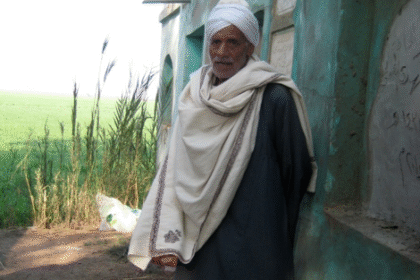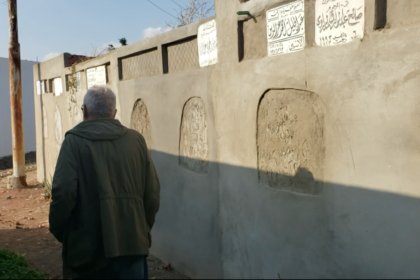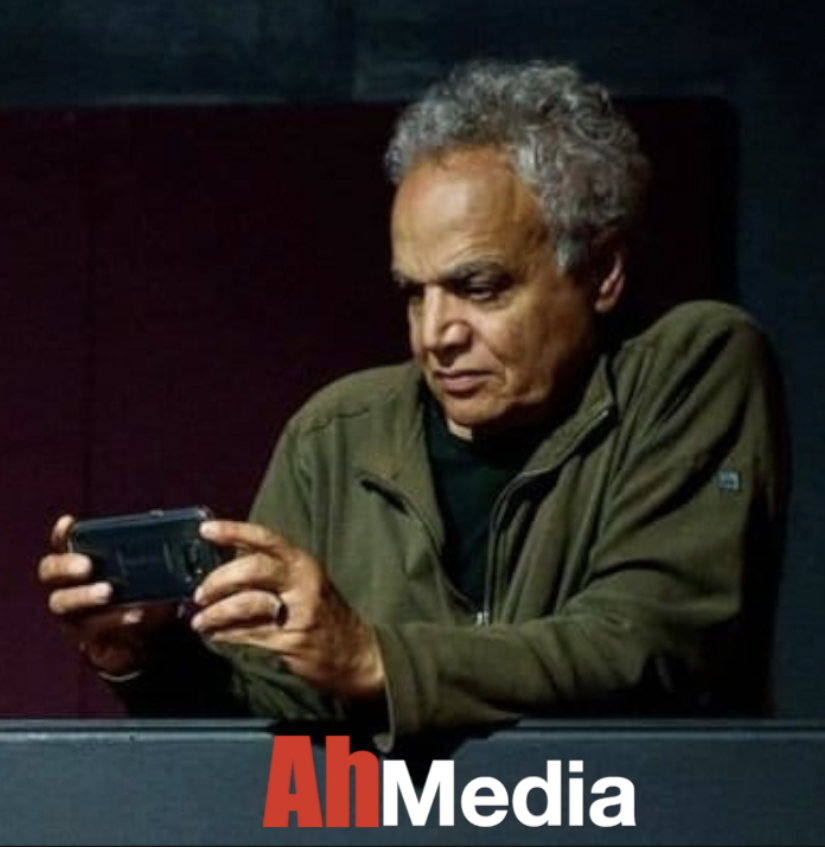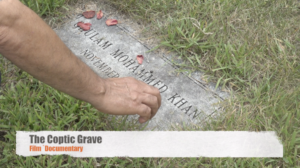
The challenge of telling the Arab/Muslim cultural story in the US is getting progressively more difficult. For years, I have been focused on bringing to the American people real stories about Arabs and Muslims, but my voice and the collective voice of the Arab / Muslim community is being lost in our current environment of racism and bigotry. The only loud Arab/Muslim voices that we hear about or that are commented on in the news are the ugly ones, the voice of Saddam, Bin Laden and lately major Nidal . American people are consistently exposed to negative stories of Arabs and Muslims. Now we need your support to tell different story.

The Christian man at the Muslim cemetery.
II. The documentary film inspired by the story of Kyriakos, a Coptic Egyptian who had live in my predominately Muslim village for years. The documentary followed his life and death trail, intercut with flashbacks from my own past and present as a minority Muslim living in the US, visiting the same places, talking to people there. As these two stories are weaved together a new story will emerge – the story of those who lived in this peaceful village of 5,000 people..!
It is a visual personal journey, soul searching inside the village For the first time after more than 40 years I went retracing my footsteps, walking through the same streets, going to the same famous cemetery where we spent endless times as youngsters. I visited the same grave of the Coptic family, where he has been buried for years. The project will be structured and shot as two parallel stories, Kyriakos’s and my own, ultimately bringing the two paths together as they form part of the documentary. Part investigation of what actually happened to Kyriakos, as told by his friends and relatives and part reflection upon my own story discussing the events with my family and friends. They never told and I never asked. It was my chance to finally explore the same questions I should have asked them as well as the things that I should have shared with them. With my own history in mind, I continue to imagine what Kyriakos, last words may have been. I investigated these questions and the impact such events have upon the human spirit.
III. Footage of interviews and background scenes shot on location in major I spoke to those who participated in the village debate, those who went through experiences of Christian/Muslim burial, and the triumph of the human spirit against all odds.”
The Story:
It is a small, unassuming village in the Egyptian Nile delta. Many people’s lifestyles haven’t changed that much since the time of the pharaohs, and local demographers have found no dramatic census changes in a long time.
Before CNN and Al Jazeera, villagers lived the simple life of a farming community, and their interest in the outside world went only as far as the edge of their cornfields. The men left with their animals for work at dawn and came back at dusk, while their women stayed home, busy raising kids to work on the farm as soon as they mastered their first step.
People seem to consult the same fashion designer, go to the same mosque to pray, eat the same food, celebrate the same holidays, and for generations, villagers have kept the gene pool very much confined to the area’s families. This is where I was born, and as youngsters, we spent most of our days trying to kill time, and playing soccer was the only game in town.
However, there was something unprovincial about my village. Unlike most of villages around us, this village had one Christian family living among them. They lived in the outskirts of the village near the cemetery, a place villagers would visit only when there was a divine call.
Unlike other villagers, who worked on the farm, the Christian family was still in the hunting-and-gathering age. They made their living chasing wild wolves lurking on the outskirts of the village during a time when wolves were considered a dangerous species. The father would disappear into the remote cornfields for days and then reappear with his kill. The family then would drag the dead wolf around the village for show-and-tell, describing the grave danger they had just faced and the heroic adventure they had encountered, which earned them considerable admiration from villagers and a handsome handout of rice, corn or whatever the season offered at the time.
Years went by, and since Egyptian Christians had the same life expectancy as Muslims, the father suddenly died. The family was not prepared for this eternal fate, and neither was the rest of the village. Although the cultural tradition of the Muslim villagers accommodated the Christian family while they were alive, the religious burial traditions were not flexible enough to accommodate the mixing of their dead in the same cemetery. The Christian family wanted to bury their father in the village and not venture away to a segregated Christian cemetery, as most of them do across Egypt.
The neighbor family of Abd Elhafeeze was not known for their religious zealotry, but for their kindness and generosity. The family logic was that if the Christian family had lived in peace with the rest of them all these years without any trouble, there definitely wouldn’t be much trouble while they were dead.
Abd Alhafeeze family consulted no one in the village. As they had welcomed the Christian family alive, so they wished to welcome them among their dead. The burial ceremony was completed with a grave, like all Muslim graves, that lacked religious symbols or eulogy — just a Christian family name, “Kariakoos,” and dates: “Born in 1911 and died 1962.”
All those years, in my village, Muslims and Christians had lived together and died together in peace and harmony. As Abd Hazeeze’s son Sheikh Obed put it, “No diversity programs were required, no axis of evil was declared, and no crusade or jihad was launched.”
Sheikh Obed, who falls in the gentle camp of Abd Alhafeeze family, who welcomed the Christian family among their dead, told me in a reflective voice, “I stop by the Christian family grave every time I visit our family cemetery.
“Please relate this story to your friends in America.”
I will. Said I, End of Story.
This is how it ended and began, too, a promise I want to fulfill, a promise to tell this story to the American people.

